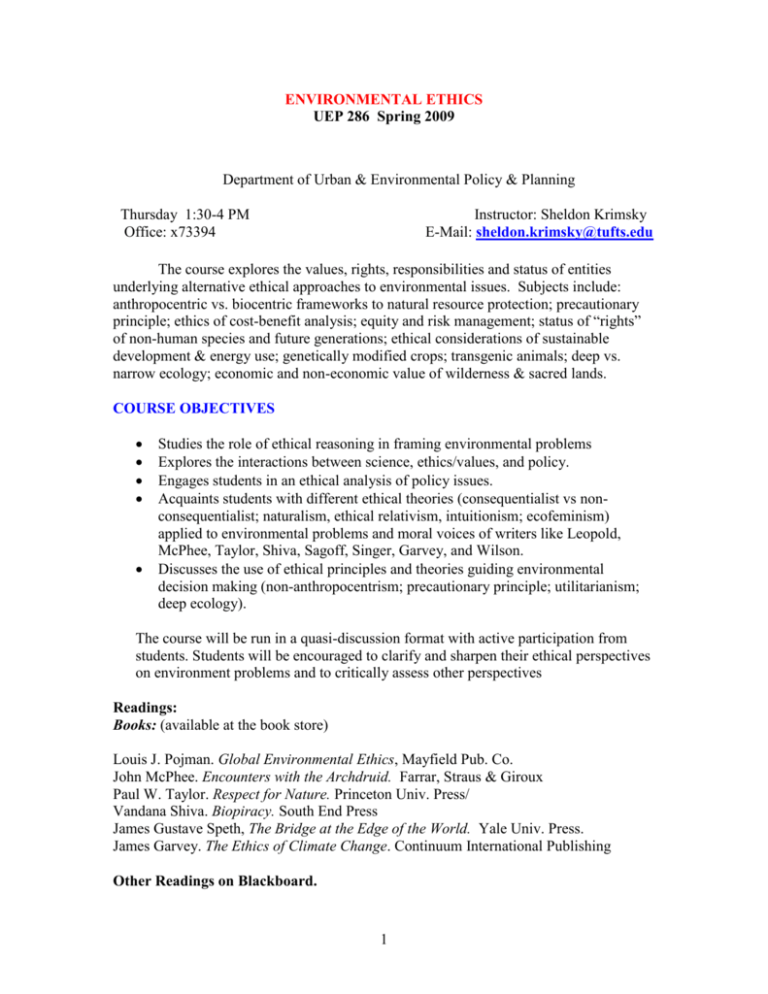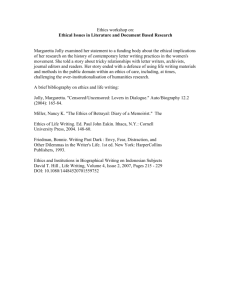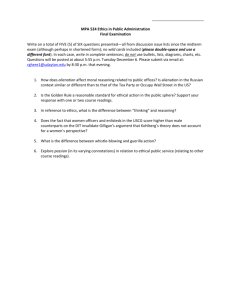ENVIRONMENTAL ETHICS
advertisement

ENVIRONMENTAL ETHICS UEP 286 Spring 2009 Department of Urban & Environmental Policy & Planning Thursday 1:30-4 PM Office: x73394 Instructor: Sheldon Krimsky E-Mail: sheldon.krimsky@tufts.edu The course explores the values, rights, responsibilities and status of entities underlying alternative ethical approaches to environmental issues. Subjects include: anthropocentric vs. biocentric frameworks to natural resource protection; precautionary principle; ethics of cost-benefit analysis; equity and risk management; status of “rights” of non-human species and future generations; ethical considerations of sustainable development & energy use; genetically modified crops; transgenic animals; deep vs. narrow ecology; economic and non-economic value of wilderness & sacred lands. COURSE OBJECTIVES Studies the role of ethical reasoning in framing environmental problems Explores the interactions between science, ethics/values, and policy. Engages students in an ethical analysis of policy issues. Acquaints students with different ethical theories (consequentialist vs nonconsequentialist; naturalism, ethical relativism, intuitionism; ecofeminism) applied to environmental problems and moral voices of writers like Leopold, McPhee, Taylor, Shiva, Sagoff, Singer, Garvey, and Wilson. Discusses the use of ethical principles and theories guiding environmental decision making (non-anthropocentrism; precautionary principle; utilitarianism; deep ecology). The course will be run in a quasi-discussion format with active participation from students. Students will be encouraged to clarify and sharpen their ethical perspectives on environment problems and to critically assess other perspectives Readings: Books: (available at the book store) Louis J. Pojman. Global Environmental Ethics, Mayfield Pub. Co. John McPhee. Encounters with the Archdruid. Farrar, Straus & Giroux Paul W. Taylor. Respect for Nature. Princeton Univ. Press/ Vandana Shiva. Biopiracy. South End Press James Gustave Speth, The Bridge at the Edge of the World. Yale Univ. Press. James Garvey. The Ethics of Climate Change. Continuum International Publishing Other Readings on Blackboard. 1 Jan. 15. Sess 1 Introduction: Ethics and Environmental Problems The role of ethics in popular discourse and policy: 6 dimensions of policy Distinguishing ethical from non-ethical (policy/scientific debates). Students’ experience with moral arguments. Popular views about ethics. www.storyofstuff.com Seminal questions in environmental ethics. Jan. 22. Sess 2 Ethical Theory in Practice Different roles of ethics in society. First principles: naturalism (including natural law ethics); utilitarianism; deontological ethics; virtue ethics; intrinsic vs. instrumental value; The dilemmas of ethical reasoning: the rhetorical power of moral discourse. Readings Frederick A. Kaufman. Ch. 1. “Moral Philosophy and the Natural World.” In: Foundations of Environmental Philosophy. McGraw Hill, 2003, pp. 1-21. [B] Joseph R. Des Jardins. Ch. 1 “Science ethics and the environment.” pp. 1-14; Ch. 2. Ethical theory and the environment, pp. 14-36.. In: Enviromental Ethics. [B] John McPhee. Encounters with the Archdruid.Part 1, A Mountain, pp. 1-75 James Garvey, Ch. 2. “Right and Wrong,” pp.33-55/ Jan. 29. Sess 3 Sacred Lands vs. Natural Resources: Conservation, Preservation Development How we value natural resources; land ethic; dams and river diversions; managing forests. Competing values in conflict: preservation vs. development. Distinction between the built and natural environment; why humans are considered outside of nature. Readings John McPhee. Encounters with the Archdruid. Part 2, An Island. Part 3 A River, pp 79245. Aldo Leopold. “The Land Ethic.” A Sand County Almanac, pp. 237-279. [B] Debate Analysis: Does wilderness have intrinsic value? In: Taking Sides, T.D. Goldfarb, ed. Pp. 2-23. [B] 2 Louis P. Pojman. Ecocentric holism: the land ethic. In: Global Environmental Ethics, pp. 154-175. World Commission on Dams. Executive Summary. Dams and Development, November 16, 2000, pp. 1-11. [B] Robert S. Devine. “The Trouble with Dams” Atlantic Monthly 276:64-74 (1995). [B] Feb. 5. Sess. 4 Biodiversity, Biopiracy and Globalization Biodiversity convention; genetic colonialism; patents on plant; rights of indigenous farmers; biophilia hypothesis; responsibility for global resources; cross-cultural and transgenerational equity. Readings Vandana Shiva. BioPiracy. South End Pres. Vandana Shiva. Ch. 5. The biodiversity convention: an evaluation from the Third World Perspective. In: Monocultures of the Mind, pp. 151-159. E.O Wilson. Conservation ethic. Biophilia, pp. 119-140. [B] Beth Baker. “Happy by Nature. Fondness for Plants and Animals may be Hard-wired, Health” Washington Post June 4, 2002. [B] Louis Pojman. Ch. 16. Preservation of wilderness and species. Global Environmental Ethics, pp. 300-326. Jems Garvey. Ch. 3. “Responsibility,” pp. 57-87. Feb. 12 Sess 5 Ecological Ethics: Transgenic Food Crops Historical background of genetically altered crops; biopollution; GMOs vs chemical pesticides; labeling; GMOs and world hunger. Readings Sheldon Krimsky. Ethical issues involving the production, planting, and distribution of genetically modified crops. In: Engineering the Farm, B. Bailey and M. Lappé, eds. Pp. 11-26. Island Press, 2002. [B] Sheldon Krimsky and Roger Wrubel. The cultural and symbolic dimensions of agricultural biotechnology. In: Agricultural Biotechnology and the Environment. University of Illinois Press, pp. 212-231. [B] Peter Rosset. Taking seriously the claim that genetic engineering could end hunger: a critical analysis. In: Engineering the Farm, pp. 81-93. [B] 3 Paul B. Thompson. Why food biotechnology needs an opt out. In: Engineering the Farm, pp. 27-43. [B] Maarten J. Chrispeels. Biotechnology and the poor. Plant Physiology 124:3-6 (September 2000). [B] Feb. 19 Monday Schedule: No Class. Feb. 26. Sess. 6 Climate Change, Greenhouse Gases and Distributive Justice Global responsibility for reducing Greenhouse gases; moral basis of the Kyoto Protocol; US position; allocating CO2 emission between North and South Readings Des Jardins: Ch. 4. Ethics, energy, and responsibilities to future generations, pp. 6488.[B] Pojman: Ch. 13, Air pollution, the greenhouse effect, and ozone depletion, pp. 245-259. Udo E. Simonis. Toward a Houston Protocol: How to allocate C02 emissions between North and South. In Ethics and Environmental Policy, F. Ferre and P. Hartel, eds. University of Georgia Press, 1994, pp. 106-124. [B] Taking Sides, Issue #17. Is immediate action necessary to minimize potential catastrophic effects of global warming? pp. 288-307. [B] J.H. Vogel. Ch. 10. Final payments: Greenhouse Gas Abatement. In Genes for Sale: Privatization as a Conservations Policy. Oxford, 1994, pp. 89-102. [B] Mark Sagoff. Controlling global climate: The debate over pollution trading. Philosophy & Public Policy 1(1):1-6(Winter 1999). [B] James Garvey, Ch. 3 “Doing Nothing.” pp.89-112. Gus Speth, The Bridge at the Edge of the World, Ch. 1-3, pp. 1-86, Debate: Is a just principle for determining global climate change responsibility “equal share of the world’s allowable emissions”? Mar. 5 Sess.. 7 Population Ethics, Pollution, Markets & World Hungar Contribution of global population growth to pollution and world hunger; IPAT equation; lifeboat ethics; markets and population growth; demographic transition; free markets & sustainability. 4 Readings Pojman, Ch. 11, Population: general considerations. In: Global Environmental Ethics. pp. 201-225. Taking Sides #6 pp. 86-109. [B] Thomas R. Malthus. An essay on the principle of population as it affects the future improvement of society, pp. 140-148. [B] Herman E. Daly and John B. Cobb, Jr. Ch. 12, Population. In: For the Common Good. Pp. 236-251. [B] Peter S. Wenz. Overpopulation, markets and human rights. In. Environmental Ethics Today. Oxford, 2001, pp. 19-38. [B] James Garvey, Ch. 4 “Doing Something.” pp.113-135. Speth, The Bridge at the Edge of the World, Ch. 4-9. Debate: Is population a key factor in preventing environmental deterioration? Mar. 12. Sess. 8 Pesticides, Mosquitoes & Disease DDT, POPs treaty, and malaria; spraying pesticides for West Nile Virus; Public health vs. environmentalism; precautionary principle; Readings EPA, DDT Regulatory History: A Brief Survey. http://www.epa.gov/ngispgm3/nrmp/history/topics/ddt02.htm D. R. Roberts, L.L. Laughlin, P. Hsheih et al. DDT, global strategies, and a malaria control crisis in South America. Emerging Infectious Diseases 3:1-11(July-September 1997). [B] Henry I . Miller. “Is there a Place for DDT?” NY Times OP ED. August 7, 2003. [B] Editorial.. “Fighting Malaria.” NY Times December 23, 2002. [B] Nicholas D. Kristof. It’s time to spray DDT. New York Times [Op Ed]. January 8, 2005. [B] Ted Williams. Out of control. Audubon October 2001. [B] John Tierney. Op Ed. Public perceptions, international policies and killers of mosquitoes. New York Times. September 16, 1999. [B] 5 Sheryl Gay Stolberg. DDT, target of global ban, finds defenders in experts on malaria. New York Times August 29, 1999. [B] Debate: Should DDT be banned internationally under the POPs treaty? March 19 Spring Break: No Class Mar. 26 Sess. 9 Consumerism, Sustainability, Forms of Market Economy, & Earth Ethics. Obligation to consume less; redefining quality of life; responsibility to future generations; North-South wealth disparity; the phenomenon of “affluenza,” the treadmill of production; theories of consumption. Readings Lester W. Milbrath. Redefining the good life in a sustainable society. Environmental Values 2:261-269 (1993). [B] Mark Sagoff. Do we consumer too much? Atlantic Monthly June 1997, pp. 80-96. [B] Paul Ehrlich et al. No middle way on the environment. Atlantic Monthly December 1997, pp. 98-104. [B] K.S. Shrader-Frechette. “Voluntary Simplicity and the Duty to Limit Consumption.” In: Enviromental Ethics by Shrader-Frechette. Boxwood Press, 1981, pp. 169-193. [B] Allan Schnaiberg. “The Expansion of Consumption” in The Environment: From Surplus to Scarcity [B} Speth, The Bridge at the Edge of the World, Ch. 10-12. . Debate: Do citizens of affluent countries have an obligation to consume less? April 2 Sess. 10 Rights and Considerations of Animals Animals as sentient beings; utilitarian vs deontological foundations for animal protection; animals in research; moral basis of vegetarianism. Is the humane exploitation of animals an oxymoron? Readings Louis P. Pojman. Ch. 7. Animal rights: sentience as significant. In: Global Environmental Ethics, pp. 106-135. [B] J. R. Des Jardins. Ch. 6. Responsibilities to the natural world: the case for animals. 6 In: Environmental Ethics, pp. 112-126. [B] Peter Singer. All animals are equal. In: Animal Liberation. The New York Review, 1976, pp. 1-27. [B] Eric Katz. Defending the use of animals by business: Animal liberation and environmental ethics. In Nature as Subject Rowman & Littlefield, 1997, pp. 79-80. [B] April 9. Sess. 11 Non-Anthropocentric Ethics I Human vs. biocentric ethics; intrinsic value of living things; A non-human centered ethical theory. Readings Paul Taylor. Respect for Nature, pp. 1-99. Tim Hayward. Ch. 3. Anthropocentrism: A misunderstood problem. In: Political Theory and Ecological Values, pp. 42-57. St.Martin’s Press, 1998. [B] Louis P. Pojman. Ch. 10.Contemporary environmental philosophy: biocentric egalitarianism. In: Global Environmental Ethics, pp. 176-200. April 16 Sess. 12. Non-Anthropocentric Ethics II Taylor’s theory of non-anthropocentric ethics; conflicts between humans and non-human living things; basic and non-basic rights/needs of species. Readings Paul Taylor. Respect for Nature, pp. 100-218. April 23. Sess. 13. Critique of Respect for Nature: Rethinking anthropocentrism as a basis for environmental ethics. Cultural Theory of Environmental Ethics Readings Paul Taylor. Respect for Nature, pp. 219-313. Don E. Marietta, Jr. In For People and the Planet. Temple Univ. Press, 1994, Anthropocentrism and Environmental Ethics.pp. 69-80; The status of values in nature, pp. 119-139; Contextual environmental ethics, pp. 141-153. [B] Mary Midgley. The end of anthropocentrism? In: Philosophy and the Natural Environment, Ed. By Robin Attfield and Andrew Belsey. Cambridge, Eng.: Cambridge Univ. Press, 1994, pp. 103-112. [B] 7 Environmental Ethics Assignments Class presentations on designated readings……… 20pts Essay 1 (3-5 pages)………………………………..10pts Debate Brief (3-5 pages) …………………………20 pts Peer Review (2-3 pages) ………………………….10pts Semester Final Paper (at least 12 pages + ref……..40pts Due on April 30, 5PM (paper copy) 100 pts 8







